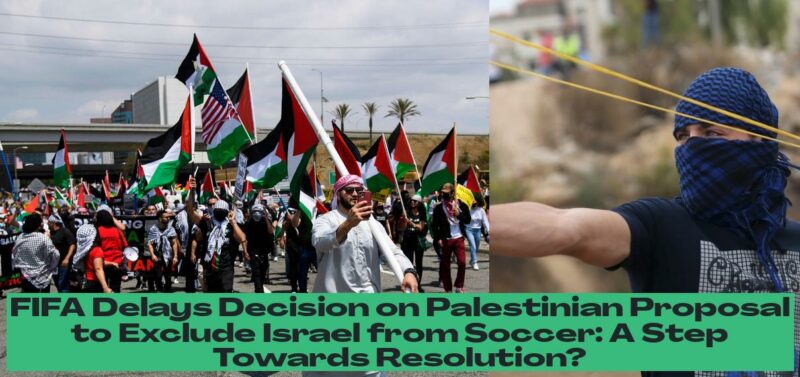FIFA Postpones Decision on Palestinian Bid to Ban Israel From Soccer
The global soccer governing body, FIFA, has put off a decision on a Palestinian bid to suspend Israel from international soccer until after the Paris Olympics. This decision, announced on July 19th, came after both parties, Israel and Palestine, requested more time to present their respective positions on the matter. While the delay might seem like a temporary setback for the Palestinians, it offers an opportunity for both sides to delve deeper into the complex issues at hand and potentially find a path to resolution that upholds the principles of fair play and sportsmanship.
- FIFA has postponed a decision on the Palestinian bid to suspend Israel from international soccer until after the Paris Olympics.
- The Palestinian bid is rooted in the long-standing conflict between Israel and Palestine, with concerns about Israel’s actions impacting Palestinian athletes.
- FIFA faces a challenging task in balancing fair play principles with sensitivity to the Israeli-Palestinian conflict, leading to a cautious approach in deliberating the issue.
- The postponement offers an opportunity for dialogue and negotiation between Israel and Palestine, potentially leading to solutions that address the concerns of both parties.
A Long-Standing Dispute
The Palestinian bid to ban Israel from soccer is rooted in a long-standing conflict between the two nations. The Palestinians argue that Israel’s actions, specifically the ongoing conflict with Hamas in Gaza, violate FIFA’s statutes and principles. They contend that Israel’s military operations in the region have a detrimental impact on Palestinian athletes and their ability to participate in sporting events. The Palestinian Football Association President, Jibril Rajoub, has been a vocal advocate for Israel’s suspension, calling for it during the 74th FIFA Congress in Bangkok.
FIFA’s Balancing Act
FIFA, as the governing body for international soccer, faces a challenging task in navigating this contentious issue. On one hand, it must uphold the principles of fair play and ensure that all member associations adhere to its statutes. On the other hand, FIFA must also be sensitive to the political realities and complexities of the Israeli-Palestinian conflict. This delicate balancing act has led FIFA to a position of cautious deliberation, postponing a decision on the Palestinian bid until after the Paris Olympics.
The Importance of Dialogue
The postponement of the decision provides a valuable opportunity for dialogue and negotiation between Israel and Palestine. While the underlying political conflict remains deeply entrenched, the realm of sports offers a unique platform for fostering understanding and cooperation. By engaging in constructive dialogue, both sides can potentially find common ground and explore solutions that address the concerns of all parties. This could involve, for example, ensuring the safety and security of Palestinian athletes, facilitating their access to training facilities and equipment, and promoting cross-cultural exchange through football.
Beyond the Soccer Field
The Palestinian bid to ban Israel from soccer, while rooted in the specific context of the Israeli-Palestinian conflict, holds broader implications for the role of sports in international relations. Sports have long been seen as a powerful tool for promoting peace, understanding, and diplomacy. However, when political disputes spill onto the sporting field, the potential for conflict and division rises significantly. This situation underscores the need for caution and sensitivity when navigating the intersection of sports and politics.
Looking Ahead: A Path to Resolution?
The postponement of FIFA’s decision on the Palestinian bid provides a crucial space for reflection and dialogue. While the path to a resolution remains uncertain, the opportunity for both sides to come to the table and engage in constructive dialogue is invaluable. By embracing dialogue and seeking common ground, Israel and Palestine can move towards a future where sports serve as a force for unity and understanding, rather than exacerbating existing tensions. The world watches with hope, eager to see football, a sport that unites people across borders, play its role in fostering a more peaceful and inclusive world.








